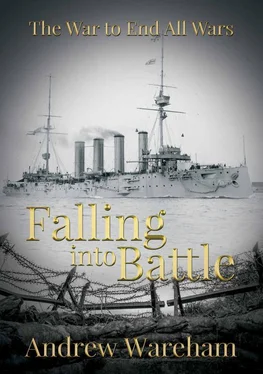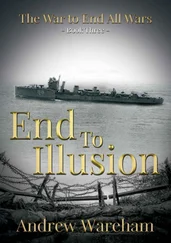Richard Baker watched from the outskirts of the crowds, not fancying being buffeted by the swaying, howling mob. They were friendly, certainly - and far too unrestrained for his taste, drunk on enthusiasm more than beer. There was something frenetic about them - a naïve desire to wash themselves in the blood of the German that struck him as unwholesome. Part of the crowd had already smashed the windows of Steiner’s bakery, because his name sounded German. It was his opportunity, he recognised – he was in uniform already, could play a cautious leading role in the rebirth of his nation, not too close to the front; near enough to be seen and to survive would be ideal.
He reported to the Drill Hall early in the morning, was informed that he had been made full lieutenant and should put up the rank immediately.
“As well, Lieutenant Baker, you should read this order, from the War Office.”
The Territorials were mobilised and should hold themselves ready for overseas service, their terms and conditions of enlistment having been modified by Order in Council. They were no longer to be restricted to postings in England, Scotland and Wales.
“The British Expeditionary Force, the BEF they will call it, is expected to sail for France within the next three days. We are to retain a training cadre in Kettering and send off our fittest, youngest and best to represent us in the ranks of the heroes. You will, naturally, be included in those to go. I have put my name down on the list.”
The captain was of at least forty-five years and had been close to retirement. The odds were high that he would be retained in England and possibly promoted major and given a training camp. Richard was more than a little envious of him, had sense enough not to volunteer to be his adjutant.
“Well done, sir. Where am I to go, sir, and who do I take with me?”
There was one second lieutenant, younger and junior to Richard. Smithers was very keen and little more than a schoolboy, only barely of age to join and much impressed by Richard’s two years at sea around the world. His father was headmaster of a local private school, just sufficiently genteel to allow his son’s commission in the Territorials. He was a pale, fair-haired youth, willowy, no more than a stripling, hardly looked like an officer; he worked as an unpaid teacher in his father’s school while he studied for University entrance. He would do, however, for all that would be demanded of a Terrier.
“You will take Smithers and Sergeant Grace, Corporals Abbott and Ekins and two platoons of eighteen men apiece. The thirty-nine comprise those who have their marksman’s badge and at least two years of training. They are our best and will represent Kettering in our great victory over the forces of evil presided over by the crippled Kaiser!”
Richard could see no difficulty there. They were to go to France and then march to Berlin, scattering the feeble forces of the Hun before them – everybody had been saying so for weeks, since war had seemed inevitable. He had not expected to take so direct a role in the triumph himself – had rather thought he might march in the celebratory parades, perhaps – but he had no doubt he could play his part as necessary.
“The word has been placed in the national newspapers that all Territorials are to report to their drill halls, Baker. It will also be shown on the screens of the moving picture theatres. Remain here, if you would be so good, and inform the selected men of their luck. When all have been given their orders – which are to muster here to march to the railway station for nine o’clock tomorrow morning – you will return to your home to prepare yourself to lead them out. You will take the train to Bedford and will be attached to a battalion there. After that – I do not know.”
Richard was less than delighted. Bedford was on the main line to London and it smacked of the possibility of joining the first to cross the Channel. He might have preferred to have been placed in the reserve. He showed keen and willing, there being no gain to anything else, and spoke personally to each of the men as they turned up. The thirty-eight local volunteers were present before ten o’clock, amazed, delighted at their great good luck in being chosen to join the adventure.
Sergeant Grace pulled them into parade order, set in two platoons and ranked properly by height, shortest in the middle. He called them to attention, handed over to Richard.
“At ease, men! We are to take the train to Bedford in the morning and will receive further orders there. You will carry your rifles, but ammunition will not be issued yet. Your corporals will check your equipment with you this morning. Be sure that you replace anything that is less than perfect. Do not bring personal belongings with you. Full sets of uniform; blankets; water bottles; cleaning kits – all as issued and correctly put away in your knapsacks as you have been shown. I know it is high summer, and very hot, but you must bring your greatcoats – we will need them on the march across Germany in two or three months time. For the moment, Sergeant Grace will dismiss you to stores and when all is ready you will return home for the night. Be fit, correctly dressed and sober for parade here at eight o’clock in the morning. Be ready and know that the whole town will be watching as you stride out to the station!”
They cheered.
“Carry on, Sergeant Grace.”
The sergeant had served more than twenty years in the Norfolks and had been given a Territorial posting as a reward in the absence of a meaningful pension. He was still fit and had no doubt he could take his boys to war, carrying his amateur officers the while.
Richard returned home in early afternoon. His father was waiting for him.
“Well?”
“We are to entrain for Bedford in the morning. I will go as a full lieutenant. The Territorials have had their terms changed, Father. We are to go to France.”
“Good. You have the chance to make something of yourself. You’re no bloody use to me at the works, but if you get promoted and pick up a medal, you can make a living at something afterwards. Come back with a bit of a name and I’ll find the money to set you up as something respectable and I’ll leave you a few quid in the Will. A motor car showroom, perhaps, selling cars – it’s respectable and you might be able to do it.”
Richard had wondered why his father had had him taught to drive in the mostly idle months since he had returned home. He had spent his days lounging about the town and driving out occasionally and reading a few books as well as practising his drill and picking up the basic skills at the Drill Hall. He had spent a good few evenings at the Palais de Dance, mashing with the local girls who all knew his father had money and a few of whom had been prepared to take some of that cash directly from him, joining him in the discreet rooms of the smaller local hotel. He had rather enjoyed the half year, in fact, and considered himself to be a man, cutting a swathe through the local womanhood. He was no longer a little sailor boy. Now it seemed that he was to make a living, after getting the war out of the way. Selling motor cars was respectable, he thought, and would give him a position in the town and the opportunity to meet more of available young females. He was glad he had chosen to cultivate the military moustache – and even more thankful he had dark facial hair that showed strong and manly. It would all go to make him seem more of a fighting soldier and it was important to look the part, especially if he could avoid actually playing it.
“Are my cousins to join up, Father?”
All three were now employed at the ironworks, were settling in to run and eventually inherit the concern.
“No! They’ve got useful things to do. Any number of orders lined up for light guns for the Army. As well, we are opening up another foundry to run out bayonets – got an order for a hundred thousand of them! Might be more to come after that. Had a chap talking about armour plate only yesterday. Difficult, that, but carries a hell of a profit. If we make that, the Navy will pay for a spur line from the railway direct to the works. Worth doing. Much too busy to lose the three boys to the Army. You’ll do to show the family is patriotic. First time you’ve been useful for anything.”
Читать дальше












